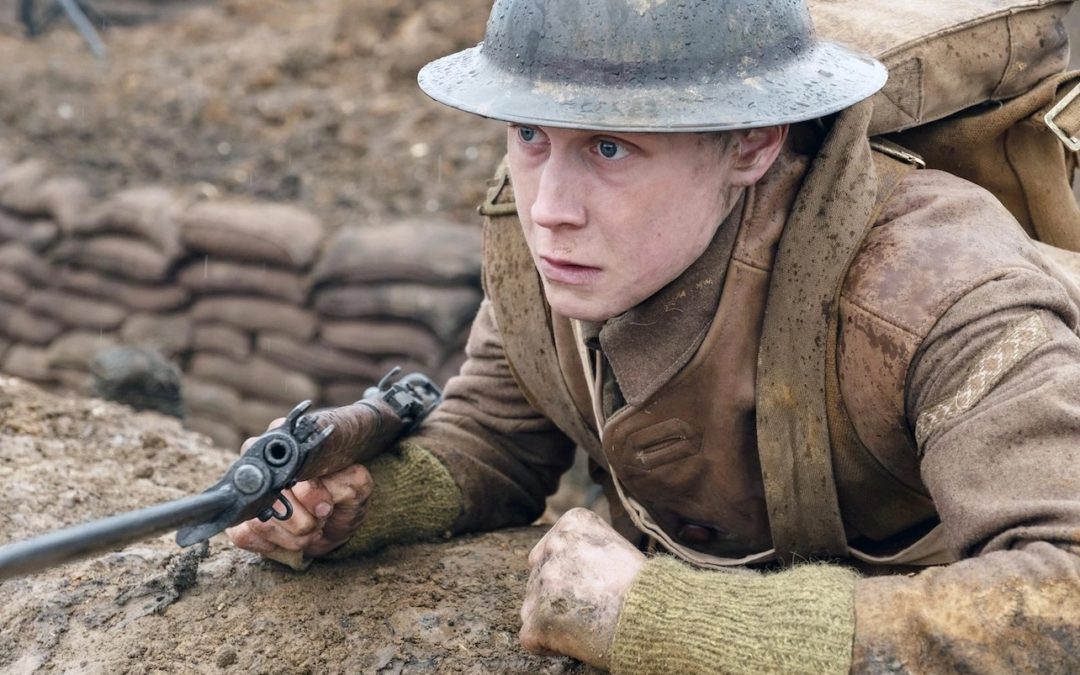Because of my experience working on Band of Brothers, writers often come to me for my opinion on war-related scripts and projects.
I’m talking battle-focused combat movies. Because after all, you could tell endless types of stories in different genres in a “war” setting. As I talk about in the genre section of my online course, war is just a setting or “modifier” that could be combined with others in a particular genre. For instance, a romantic war comedy. Or a psychological war thriller.
But we’re not talking about those. We’re talking about action movies focused on military engagements and military units with lots of shooting, bombing, etc.
And what I’ve noticed are a few common approaches to writing war movies that can be difficult to make work for audiences, and two that I see as better choices.
His use of the word “genre” is a bit different than the classic genre labels like “horror,” “drama,” etc., and more helpfully describes the central problem and goal in a particular story type and the three key attributes of that genre. So in an “Out of the Bottle” movie, you have a “wish,” a “spell” and a “lesson.”
In his second book, Save the Cat Goes to the Movies, he breaks down the genres into five subgenres each. (So fifty total.) This chart summarizes them.
The two best approaches
You’ll see the two very specific type of military movies that over and over again seem to work for audiences, contained within two of these fifty subgenres.
The first is the “Military Institution” subgenre of “Institutionalized,” which is about the hell of war for a certain individual or individuals. It’s not so much about carrying out some important triumphant mission and more about the horrors of war for human beings engaged in it. Films like Platoon, Catch-22 and Full Metal Jacket come to mind. These are the “anti-war” films about the military as an “institution” that someone is trapped in and feeling the pain of.
The second type is the mission-focused military movie, which tends to fall into the “Epic Fleece” subgenre of “Golden Fleece.” In these, you have a small unit, typically, with a particular, high-risk, very important mission that takes up the whole movie, essentially. In the end, it’s either achieved or it isn’t, and the audience cares deeply whether it is. And there are a lot of costs along the way. Think Saving Private Ryan, 1917, Das Boot or even the original Star Wars. These are contained stories about specific goals.
What to avoid in writing war movies
What doesn’t work so well is to go against that model by violating one of its attributes in the following ways:
1. It’s not focused on a very small group.
2. It’s not focused on a particular mission that takes the whole movie to complete.
3. The audience doesn’t have a strong rooting interest due to the stakes of that one mission.
If you’re writing a script that seeks to celebrate, honor and document the achievements and horrors that a particular military unit experienced, you might be missing these.
I see these kinds of projects a lot, often from the family of a member of said unit. Usually the unit had some particularly noteworthy things they did or that happened to them. And their story “has never been told.”
All good things, in theory.
But movie audiences tend to need a focused specific problem to engage with. And a desired outcome to it, that all hinges on a particular question: Will Charlie Sheen survive the horrors of Vietnam mostly intact? Will Tom Hanks save Private Ryan? Will the 1917 guy get that important message to the right people in time, to save a bunch of lives?
Focused, right? Important. Emotional. Contained. Active.
The story of a unit isn’t those things, typically. It’s a lot of different people with a lot of different experiences over a lot of different battles.
So is the story of a particular war or even battle — a lot of units involved, too many to keep track of. Not contained enough to be able to focus on a handful of people we really get to know who are key to its success.
Yes there are (mostly older) movies that try to document something larger like this, such as The Longest Day (all of D-Day from the Allies’ point of view) or A Bridge Too far (all of Operation Market-Garden from the Allies’ point of view).
While some of these can be great documents of an historic undertaking with strong moments to them, they tend to be scattered in terms of narrative and character, and less effective and successful as drama (or action).
What about Band of Brothers?
I can imagine you asking, at this point, why Band of Brothers works, in that it follows a whole unit over many battles, with lots of characters and no one distinct mission at its heart.
First off, as a series, not a movie, it needs multiple stories for multiple episodes, and to a large extent, each episode is a particular mission, with the experience of a few people getting the focus.
Secondly, the series as a whole is meant to be a tribute to American soldiers in World War II in Europe in the form of a particular company who was involved in several of the most important battles and were representative, as such. With a focus on the brotherhood of these men and all they went through together. It’s somewhat the story of the whole war, from an American soldier’s perspective, at least the war in Europe, with the easy-to-root-for goal of “defeating Hitler” divided into specific segments. And mixed in with personal stories for a variety of characters we come to know.
If your story doesn’t have quite that easy-to-get-behind sense of mission and goal, either overall as a possible series or in specific mission-focused episodes, you can have a tougher time. You want the audience to feel there’s an objective they strongly care about, both for the characters and the larger war effort, and a clear “success or failure” aspect to it, including the episode-long sub-missions. What tends to not work is when you try to hit all the highlights (and lowlights) of what a certain unit experienced or achieved, but there’s not quite that sense of mission.
Thirdly, and perhaps most to the point, Band of Brothers did not start out as a spec script from a writer who was trying to break in. Limited historical series tend to not be the best choice for such a writer. (Arguably, TV isn’t in general.) They’re normally developed internally by major producers. In this case, Tom Hanks and Steven Spielberg took the pre-existing, much-loved Stephen Ambrose book to HBO. Later, us writers came on board to create scripts.
So my recommendation is this: if you have a military story, see if it can be a movie, and see if that movie can follow the precepts above. And remember that the goal is first and foremost to connect emotionally with a mass audience, even if you’re also, importantly, trying to celebrate the achievements of a particular military group or individual that deserves to be celebrated.



Erik,
I loved the topic. Always great advice! Can you also may touch on other genre’s like comedy, horror, etc?
How would The Deer Hunter fit into the aforementioned genres of at all? How difficult is this type of war movie to write?
I would put The Deer Hunter is closer to the “Military Institution” type, although it’s not really a combat/action focused film that takes place primarily in active battle situations, unlike Platoon or Catch-22 so it might be a bit outside the scope of what I’m talking about here.
I would say in any case this type is very difficult to write well, but so are most types of movies! 🙂
I’ll think about that Joe – thanks for the comment!
After our recent chat, I am honing my idea for a war story. Keeping everything small, but significant for the protagonist!
Sounds good Chris – thanks for checking in!
Thanks, Eric!
I’m outlining a “military” story right now and will take another look at the “Epic Fleece” pages in SAVE THE CAT! GOES TO THE MOVIES. (pp 40-43 in my 2007 edition).
Godspeed.
To you as well Paul!
I’d be honoured if you could find the time to read my own 90-minute WW2 script (link attached). You will see that your teaching and work were major influences in my own screenplay. I’d welcome any comment you may wish to make.
Steve Wand
https://pebblepathway.com/fallen-eagle
Thanks Steve – emailing you separately…
Thank you Erik. Your analysis seems spot-on and helpful as a guide
for writing a successful war drama. I can agree the “Cat” menagerie
could be a help too in loosely identifying and/or classifying them into
sub-genres. It’s always been my impression though that the “cat”
clawed its way too far up a tall tree when it became prescriptive
about shoehorning every script into its slots. I’m still a big fan of
the more elastic 3-act story structure.
We could probably have a lengthy debate/discussion on that latter point! 🙂
I appreciate the comment and am glad you found it useful!!
Too many films made by people who have obviously never been in war.
My Darnitska Sich is the true story of a small group of people 2012-now in the Ukraine War. Battefields and beer bars.
I suppose Platoon is an exception to that as Stone was in Vietnam but I think I can say for all of us who wrote on Band of Brothers, guilty as charged… 🙂
Erik Bork
Excellent advice greatly informative on the topic.
I have been working on a film project and/or series based on Major Oscar R. Fladmark WWII and Korean War experiences (ie Wikipedia article, Oscar Randolph Fladmark). The project has been in collaboration with individuals who have specific background associated with the subject.
Previously, I have received correspondence from the late Stephen Ambrose and Tom Brokaw concerning the efforts.
Incidentally, I worked on the film Jarhead, with director Sam Mendes (ie director 1917 film).
Very Truly Yours
Gary Fladmark
gfladmark@yahoo.com
1 909 301 1548
http://www.stage32.com
http://www.garyfladmark.com
Thanks so much Gary – emailing you separately…